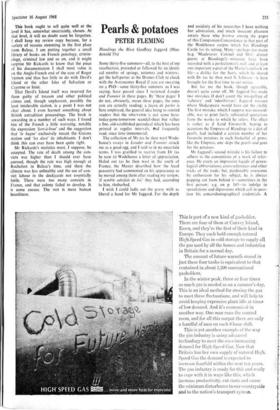RAYNER HEPPENSTALL
Convict's tale
The Man from Devil's Island Colin Rickard, (Peter Dawnay 25s)
This little book is very oddly put together. Mr Rickards, a journalist who knows the Carib- bean and has worked on West Indian news- papers, depicts himself as sitting twelve years ago outside a Montmartre café and being approached by a man who had spent twenty- one years in and around the convict stations of French Guiana, as the result of killing his common-law wife and her lover, caught unex- pectedly in bed together. Most of the book is thereafter presented as the first-person narra- tive of this ex-convict.
Mr Rickards himself does not claim to be- lieve that the name the convict gave, 'Etienne Artaud,' was his real one. He intersperses the narrative with historical and other matter which, in footnotes, he candidly admits to have been mugged up from other sources. He messes up the chronology, and he does not seem to be making any serious attempt to get inside his supposed narrator's skin, but only to record objective fact. It would all have been a gift to a novelist, but Mr Rickards is not a novelist, yet much of the time is behaving as though he were. This is all very odd. Journalists have their own legitimate function, and in the case of straightforward reporters it is a perfectly honourable function. I can't think why Mr Rickards is at once so devious and so inter- mittently candid.
Where he has drawn upon books and where I am able to check what he says from other books, Mr Rickards emerges with credit. The history of the colony seems right (though there is no mention of the aristocrats exiled there after the Revolution). Mr Rickards's account of the escape of Dr Bougrat in the late 1920s. and of his long survival as an honoured doctor in Venezuela, concordantly fills out detail, appended to a recent account of the trial (for murder of a patient, in Marseilles) by Marcel Montarron, who, however, gives the date of Bougrat's death as 1961, the year before Mr Rickards's date. There is, on the other hand, no mention in Rickards of Guillaume Seznic, who must have been contemporary with both Bougrat and 'Etienne Artaud' (and, indeed, .;0 far as I can see, must have gone out, in 1927, with the same consignment as Bougrat). In a Scottish court, the Bougrat verdict, I fancy. would have been 'not proven,' while I imagine that Seznec would have been acquitted in any British court. This book ought to sell quite well at the level it has, somewhat uncertainly, chosen. At that level, it will no doubt soon be forgotten. I shall keep my review copy because, for a variety of reasons stemming in the first place from Balzac, I am putting together a small library of books on French penology, crimin- ology, criminal law and so on, and it might surprise Mr Rickards to know that the piece of his documentation I shall most value is on the Anglo-French end of the case of Roger Vernon and thus has little to do with Devil's Island or the other Isles of Salvation or Cayenne or Inini.
That Devil's Island itself was reserved for those guilty of treason and other political crimes and, though unpleasant, possibly the least intolerable station, is a point I was not clear about. I even learned something about British extradition proceedings. The book is rewarding in a number of such ways. I found bits of the French a little worrying, notably the expression 'fort-a-bras' and the suggestion that `le bagne' exclusively meant the Guiana station and `les durs' its inhabitants. I don't think this can ever have been quite right.
Mr Rickards's statistics must, I suppose, be accepted. The rate of death among the con- victs was higher than I should ever have guessed, though the rate was high enough at Rochefort in Balzac's time, and there the climate was less unhealthy and the use of con- vict labour in the dockyards not essentially futile. There were too many convicts in France, and that colony failed to develop. It is some excuse. The rest is mere human beastliness.



































 Previous page
Previous page